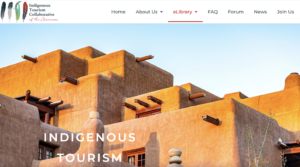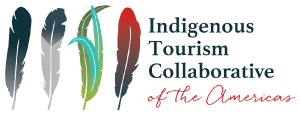On International Day of the World’s Indigenous Peoples Wednesday August 9, 2023, the Indigenous Tourism Collaborative of the Americas (ITCA) celebrated the launch of its Indigenous Tourism eLibrary. The eLibrary – https://elibrary.indigenoustourismamericas.org/ – features hundreds of resources, many in both English and in Spanish, with the goal of helping “communities, business and organizations better manage Indigenous tourism.”
The eLibrary launch featured several guest presenters: Susana Costa Resende, Technical Coordinator, Ethics, Culture and Social Responsibility for UNWTO; Ben Sherman, Chairman of the World Indigenous Tourism Alliance (WINTA); Ricardo Campos Quezada, President of the Indigenous Tourism Network of Mexico (RITA); and Jamie Sweeting, President of Planeterra and Vice President for Social Enterprise and Responsible Travel at GAdventures. The moderator was Levi Rickert, editor and publisher of Tribal Business News and founder, publisher, and editor of Native News Online. ITCA is grateful to each of them for their time and expertise.
The Indigenous Tourism eLibrary resources are divided into four main categories: socio-cultural, management, economy, and environment. Users can filter the resources via topic, geographic focus, and stakeholders, or by searching for the title, author, or publisher.
Below are three resource examples:
Compendium of Good Practices in Indigenous Tourism – Regional Focus on the Americas
Presented during the webinar by Susana Coste Resende and Ben Sherman, this resource is provided by the World Indigenous Tourism Alliance (WINTA) and the United Nations Tourism Organization (UNWTO). Their publication illuminates what goes into the “planning, management and promotion” of responsible and sustainable indigenous tourism development, specifically in the Americas. The article also includes advice on how to ensure the “responsible conduct of tourists who…visit indigenous communities.”
Presented during the webinar by Ricardo Campos Quezeda, this resource publication is about Community Biocultural Protocols. Biocultural community protocols (PCBs) set forth terms and conditions for governments, the private sector and research and non-profit sectors to work equitably with Indigenous communities. PCBs are developed via communities’ decision-making processes and are rooted in their values and laws. They highlight fair rules of management, conservation and protection of natural resources and biodiversity.
https://media.gadventures.com/media-server/dynamic/admin/flatpages/indigenous-2017-11-29.pdf
Presented during the webinar by Jamie Sweeting, this resource is “Indigenous People and the Travel Industry: Global Good Practice Guidelines,” researched and published by GAdventures and the International Institute of Tourism Studies at George Washington University. It outlines important guidelines and best practices that protect the interests of Indigenous communities and travel companies and emphasize the special responsibilities travel companies have to protect Indigenous communities.

